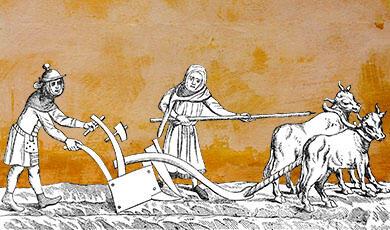Press release: the Medieval Agricultural Revolution

Extensive cereal farming in medieval England created large surpluses, driving population growth, markets and wealth inequalities
New scientific evidence reveals that key features of medieval farming -- systematic crop rotation and use of mouldboard plough – first became widespread during the 10th and 11th centuries
But did extensification degrade soil fertility and contribute to the Great Famine?
Embargo: 23 March, 7pm
We would like to invite you to a Gresham lecture on the Medieval Agricultural Revolution: New Evidence, by Professor Helena Hamerow, Professor of Early Medieval Archaeology at the University of Oxford, a Fellow of St Cross College, Oxford and an Honorary Fellow of Lincoln College, Oxford.
In this lecture Professor Hamerow will explain that the concept of the Medieval Agricultural Revolution has caused debate for over a century – was it a pre-Conquest development or linked to the Normans? Did it involve rapid change, or was it a more drawn-out process? Why can’t we agree? She will argue that “the central problem is a lack of direct, closely dated evidence for medieval fields and for the conditions in which crops were grown. We need new data.”
Hamerow will present such data, recently produced by the ‘FeedSax’ project. Analysis of medieval plant and animal remains excavated from sites across England have provided new information about the soil conditions in which crops were grown, soil fertility and soil disturbance, and whether crops were grown in rotation in the same fields, or separately in different fields; a study of cattle bones reveals the spread of the mouldboard plough by looking at the deformities in their feet.
“Just over 700 years ago, Europe emerged from a subsistence crisis of such magnitude, that it is still referred to as the Great Famine. Countless people perished, and it marked the end of the period of population growth and relative prosperity we have just considered…. Could centuries of highly extensive, low-input farming regimes and the associated deterioration in soil fertility, the evidence for which we have seen, have been an underlying causal factor?,” Hamerow will ask.
You can sign up to watch this hybrid lecture online or in person.
ENDS
Notes to Editors
You can sign up to watch the hybrid lecture online or in person; or email us for an embargoed transcript or speak to Professor Hamerow: l.graves@gresham.ac.uk / 07799 738 439
Read more about Professor Hamerow
Sign up to our monthly newsletter here to get advance notice of our events.


 Login
Login



